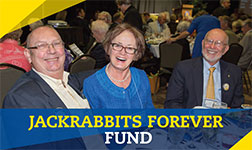This past year, the POET Bioproducts Center — a first-of-its-kind bioprocessing center — opened in the Research Park at South Dakota State University. The center is expected to be the centerpiece for the innovation and development of biofuels, bioplastics and other agriculture-based renewable products.
Peggy Gordon Miller, then South Dakota State University’s president, had a vision.
It was 2006, and a research park — something South Dakota was lacking — could help transform the eastern South Dakota economy and bring immeasurable long-term benefits to SDSU, she said.
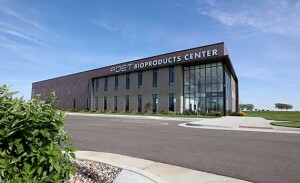
The entrance to the center, pictured above, overlooks SDSU’s main campus from the east and welcomes visitors with information on some of the ongoing projects. The close proximity to campus will be crucial in allowing faculty members access to the center’s equipment and services.
“We need a research park — the last piece in a puzzle where we can take real incubation, real ideas and grow,” Gordon Miller said in 2006.
The city of Brookings, Brookings County, state representatives, the Brookings Economic Development Corporation, SDSU, the SDSU Foundation and several private sector interests had come together to form the SDSU Growth Partnership. Construction started in late 2006, and in 2008, the Research Park at SDSU officially opened as a physical environment that could develop, attract and retain technology companies that are aligned to the talent and sponsored research conducted at SDSU.
Modeled after the Research Triangle Park in North Carolina, the expectation was the space provided by the research park would welcome startup companies, high-value research labs and more along the growing Interstate 29 corridor.
Fifteen years later, Gordon Miller’s grand vision is coming into focus.
During Hobo Week this past year, the POET Bioproducts Center opened in the Research Park at SDSU. Gordon Miller was on hand for the ribbon-cutting ceremony, where higher education leaders, legislators, industry partners and leading scientists gathered to celebrate the first-of-its-kind bioprocessing facility.
“This specialized facility and the specialized expertise that goes with it is the latest provision of the Research Park at SDSU for the purposes of fostering public-private partnerships to move university-sourced technology and innovation into the marketplace,” said Daniel Scholl, vice president for research and economic development at SDSU.
Opportunity arises
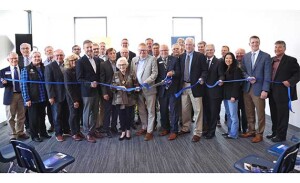 Whether we like it or not, the world’s petroleum reserves will run out, explained bioprocessing engineer Greg Opdahl. When that will be is anybody’s guess; however, the bioprocessing research expected to pass through the center will be instrumental in preparing for when that day eventually comes.
Whether we like it or not, the world’s petroleum reserves will run out, explained bioprocessing engineer Greg Opdahl. When that will be is anybody’s guess; however, the bioprocessing research expected to pass through the center will be instrumental in preparing for when that day eventually comes.
“The opportunity here with bioproducts isn’t against fossil fuels. Rather, it’s an alternative that could be more successful,” Opdahl explained. “It can help grow and expand the existing agricultural-based economy in South Dakota, which will always be in South Dakota. Why would we not take advantage of this opportunity?”
Bioproducts, like biofuels and bioplastics, are created through bioprocessing — a process that creates products from a living thing. Beer produced from yeast via fermentation is an example of bioprocessing.
“Bioprocessing is focused on products that are produced from some form of organism,” Opdahl said. “When you think of ‘bio,’ you think of agriculture and growing things, but what you probably don’t think of is petroleum and chemical synthesis — basically, how (traditional) plastics are made. But what if you can take your ag product in the field and turn it into a (bio) plastic and avoid using a petroleum base? Not only is that sustainable, but it’s also where we need to go as we run out of petroleum.”
Both SDSU and South Dakota Mines — partner universities at the center — have ongoing faculty-led projects that are developing a variety of bioproducts. As Opdahl notes, these are the exact types of projects that can — and will — utilize the center.
Helping startups get off the ground
Dakota BioWorx, a not-for-profit organization, will manage the center and help facilitate the public-private partnerships that are expected to emerge. Craig Arnold is the CEO, and Opdahl, a Brookings native, is the organization’s first employee.
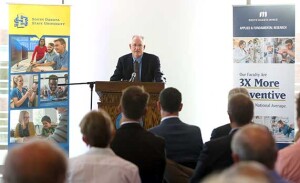
Craig Arnold, pictured above speaking at the center’s ribbon-cutting ceremony, was named the CEO of Dakota BioWorx, a not-for-profit organization that will manage the center and help facilitate the public-private partnerships that are expected to emerge.
“We are the team that plays in the stadium,” Opdahl said. “The team is Dakota BioWorx, and the stadium is the POET Bioproducts Center.”
Arnold brings a bevy of experience to his role, having served in a variety of leadership positions for more than 30 years. His past experience includes serving as president and CEO of Nanopareil LLC, a South Dakota biotech startup that commercialized a South Dakota Mines nanotechnology for purifying drugs and vaccines. He also was a director at the Bill and Melinda Gates Foundation and held leadership roles at Northrop-Grumman and Boeing.
Dakota BioWorx will also manage the center’s specialized equipment — one of the key elements that will help move research projects through the “piloting phase” — or what is more commonly known as the “Valley of Death” to researchers and entrepreneurs.
“The team of experts at Dakota BioWorx helps to scale these new biotechnologies, as going from the benchtop to the pilot scale is typically the riskiest step in commercializing new ideas,” said Matthew Cole ’19, SDSU graduate research assistant and CEO of Pioneer Biotech. “Having everything from the bench to the pilot scale and analytics to expertise under one roof makes the commercialization process much cheaper and faster than at other facilities in the U.S.”
The center will provide the resources needed for these projects and companies to either successfully get through the piloting phase, or to provide the knowledge that their product isn’t commercially viable without having to invest thousands, or even millions, of dollars.
“What we provide is that pilot-scale equipment, so they don’t have to have a large capital investment to see if their process works,” Opdahl said. “Not only will we provide them the equipment, but we will also provide the technical expertise. That way they can move onto commercialization faster.”
The availability of this equipment to researchers is really what makes the center unique. Some equipment, like the Relco Pilot-Scale Spray Dryer System, is unique and was built specifically for the center.
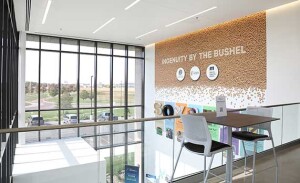 “The (center) will significantly de-risk the commercialization of all types of bioproducts,” Cole added.
“The (center) will significantly de-risk the commercialization of all types of bioproducts,” Cole added.
The combination of specialized equipment and technical expertise, situated directly in the middle of America’s heartland, makes the center different than most other facilities in the country. As Opdahl notes, researchers often had to go to Europe to utilize their research plants before the center’s opening.
“Not only is the U.S. lacking the capacity, but the need for it is growing as people are becoming more aware that we need the sustainability that bioproducts present,” Opdahl said. “This is really a unique facility in that it’s really the first of its kind that was built specifically for (bioprocessing).”
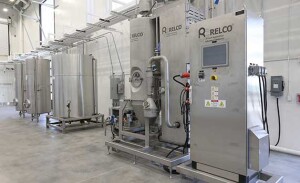
One of the most important features of the POET Bioproducts Center is its specialized equipment. Pictured above, some of the Relco equipment that researchers will utilize to move their exciting discoveries into viable commercial products.
“It speaks volumes to our farmers and their commodity groups investing in this state-of-the-art facility to have it here in South Dakota,” Cole said. “This is a huge accomplishment for South Dakota and its farmers.”
Center made possible through public and private funding
As the center begins rolling out its equipment and labs for use, the Dakota BioWorx team will add more expertise to its roster, including fermentation specialists, processing specialists, characterization specialists and lab technicians.
“What we are trying to provide is a holistic environment for ideas and intellectual property to scale up,” Opdahl said.
The 43,510-square-foot facility was made possible through $20 million in legislative funding, $5 million from POET — the world’s largest producer of biofuels and a leader in bioproducts — and $2 million from South Dakota Corn.
“At POET, we’re proud to have been at the forefront of ag and biotechnology innovation for 35 years,” said Jeff Broin, POET founder and CEO. “We are committed to investing in the next generation of leaders who will pave the way to the ag-based bioeconomy of the future. We have only begun to scratch the surface of what agriculture can do, and this venture will play a vital role in the ability of today’s bright young minds to continue our legacy of ingenuity.”
The South Dakota Soybean Research and Promotion Council provided an additional $500,000 annually for five years — a total of $2.5 million — and the state of South Dakota has committed $500,000 yearly for bioproduct research at the partner universities. The U.S. Economic Development Administration provided another $3 million for the specialized equipment.
The center and partner universities are expected to produce more than $6 million annually from research expenditures. Estimates also include more than $4 million annually toward South Dakota industries accessing pre-pilot scale-up lab and bioprocessing services.
“This facility would not be possible without the strategic partnership of the state of South Dakota, POET, South Dakota Corn, South Dakota Soybean Research and Promotion Council, South Dakota Board of Regents, South Dakota Mines, South Dakota State University and the Research Park at SDSU,” SDSU President Barry Dunn said at the ribbon-cutting ceremony. “Thank you all for your willingness to trust us and financially support the building of this incredible facility.”
Addison DeHaven



